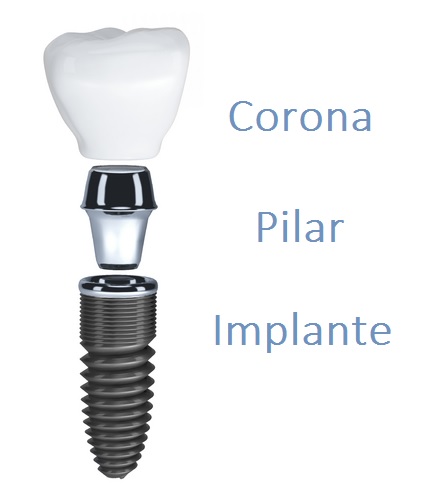DENTAL IMPLANTS
Dental implants, Puerto de la Cruz, Tenerife
DENTAL IMPLANTS

Dental implants are ideal substitutes for natural teeth.
It is very important to be aware that not replacing a missing tooth can cause us to lose other teeth. The remaining teeth in the mouth will shift to fill the gap causing a chain effect.
The implants are “anchored” to the bone, thus providing a stable base to support the dental prostheses. It is a simple and painless treatment, which helps to restore a beautiful, functional and healthy mouth.
Placing a dental implant
1.Diagnosis, study and planning
In this phase the implantologist will carry out a complete examination of the mouth and a series of diagnostic tests:
- CBC
- Radiological tests
- 3D Scanner
- A complete dental and general health questionnaire
In this phase, the entire treatment is planned, the patient is informed in detail, and it is also determined whether any pre-treatment is necessary.
2. Placement of dental implants
The placement of the implants is a simple and painless process that is carried out in the clinic under local anaesthesia. If the patient is fearful, it can also be done under conscious sedation.
At this point or up to 48 hours later, immediate loading can be carried out. A provisional prosthesis is placed which will allow us to preserve the aesthetics and functionality of the mouth until the definitive one is placed. This prosthesis will be replaced by the definitive one when the osseointegration process of the implants has been completed.
3. Healing
The stitches can be removed within a week. The implant will now have to integrate into the bone, this is known as osseointegration and is a process that takes about three months.
4. Fitting of the prosthesis (crown, bridge, arch)
After the osseointegration process of the implant in the bone, measurements are taken by means of an intraoral scanner to manufacture and place the personalised prosthesis. It takes about two weeks from the time the measurements are taken until the prosthesis is fitted.
This is a very important stage that requires perfect coordination between the medical team and the technical team, the prosthetists.
If there has been immediate loading, the provisional prosthesis will be replaced by the definitive one.
When the gap to be covered is in the smile area, we can opt for an immediate loading implant so as not to have a gap in the teeth during the time the implant is integrating into the bone.
5. Maintenance after dental surgery
Just as we must carry out regular maintenance of our natural teeth, we must do the same when we have implants. It is very important not to skip check-ups and remember that although prostheses do not have caries, they do have other pathologies such as peri-implantitis that can cause us to lose the implants.
Itahisa tells us about her experience at Artedental when she replaced a missing tooth with a single tooth implant.
Frequently asked questions about dental implants
It is normal for patients to have doubts about dental implant treatments, that is why we want to answer the most frequent ones and encourage you to ask for a free first appointment at Artedental, in Puerto de la Cruz, where we will be able to resolve any doubts you may have about your particular case.
No, it is a procedure that is performed under local anaesthesia.
If there are many implants to be placed, the procedure can be a little long, but not painful.
If the patient has a dental phobia, a situation that makes it advisable, or simply wants to be even more comfortable, the surgery can be performed under sedation or general anaesthesia. Always under the supervision of an anaesthesiologist.
This all depends on many factors that the implantologist must assess. But normally:
- When we are missing only one or two adjacent teeth, we will replace them with one implant each.
If we are missing several adjacent teeth, we can replace them with two implants and a dental bridge that - will be attached to them.
- In the case of a complete arch, we can replace it with only four to eight implants.
To get a dental implant you have to wait until the jawbone has completely developed, 16 years for girls and 18 years for boys.
However, there is no upper limit determined by age, although other factors such as the general health of the person, the quality of the jawbone, etc. must be taken into consideration.
Being a smoker is not in itself a contraindication for implant placement but it does increase the failure rate of implants.
No, titanium is a biocompatible metal that has not shown any toxic or irritating reaction on the tissue of the mouth.
Therefore, the possibility of a rejection or allergy reaction is extremely unlikely.
Yes, if the diabetes is well controlled.
The success rates for dental implants in diabetics are the same as for other patients, more than 98%.
The success rate of dental implant treatment is 98% when carried out by dentists specialised in implantology and at Artedental in Puerto de la Cruz we offer you a guarantee and an experienced team of specialists.
Implants have an almost unlimited life span, as long as they are cared for.
Implants do not have cavities, but the surrounding tissues can become diseased and cause the implant to lose its hold. That is why good hygiene and regular check-ups are so important.
Yes, there are situations in the general health of the patient that may contraindicate the placement of implants (too young, serious or poorly controlled systemic diseases, pregnancy, severe bruxism, significant drug use, etc.). There are also oral problems that may prevent it (lack of bone quantity or quality, periodontal diseases, anatomical obstacles…).
This is why it is very important to be assessed by a specialist in implantology who can detect possible problems, solve them if possible, and advise against the placement of implants and provide information on alternatives if necessary.
